There are a lot of things that we, as corgi owners, don’t know about our pets. One thing in particular that I was interested in is why do corgis poop so much.
There is no simple answer to this question, but there are indications that can tell you about this strange habit of theirs. The majority of reasons for this strange occurrence lies in their digestive tract – I’ll elaborate on that later in detail.
Other than the explanation for this habit of your pet, there are some things you should understand about your dog’s digestive system and how it works as well as some things you as a corgi owner can do in order to control your dog’s pooping habits and tailor them so that they fit your habits.
All of this might seem complicated to some of you, but don’t worry about that for now. I’ve gone into such detail about this topic that I guarantee you that there won’t be a single thing you don’t understand at the end of this article.
So let’s take a look at the reasons behind this question and some interesting facts about what makes your corgi want to go poop so much.
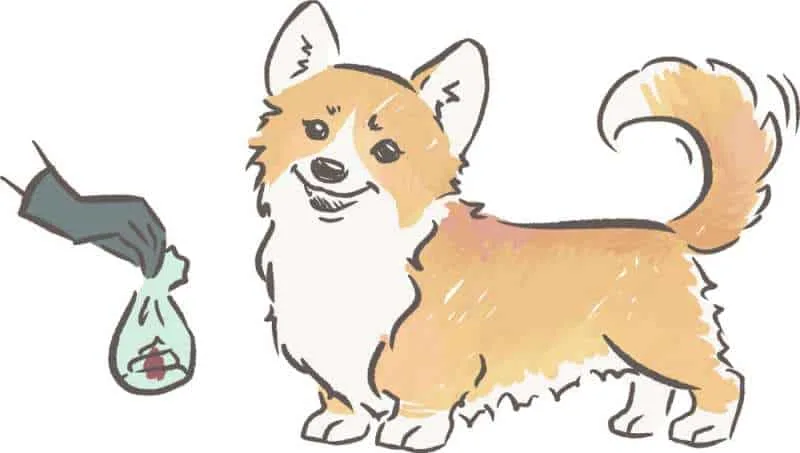
Genetics
Some people might think that this occurrence is completely genetic, but it’s not. There are some genetic-related facts about your corgi’s pooping habits, but that’s not all there is to it.
For example, corgis have a tendency to poop multiple times a day because of the smaller amount of feces that they relieve themselves from in one pooping session. This is because of their elongated bodies that allow them to hold a lot more poop than you’d imagine.
They poop in smaller quantities and hold the rest of it because it’s instinctual to them. There’s no clear answer to why they do it – but they just do.
Another interesting thing that is genetics related to this situation is that most corgis can go poop up to six times in a 24 hour period. There might be situations where this is alarming, but if the consistency of their poop is good, you shouldn’t worry too much.
It’s best that when you take your corgi out to pee and poop you stay long enough so they relieve themselves of most of the poop they hold in. You should also give them a treat every time they poop in a quantity that seems more than usual so they know that if they let themselves poop more and hold less poop that they’ll be rewarded for that.
It’s also a good practice to go on walks that are intended for pooping at the same time every day so your corgi gets used to holding their poop until it’s time to go out.
There are all ways to trick your corgi’s genetics and shape them in a way that won’t cause too many problems for you on a daily basis.
On the other hand, your corgi might know how to hold their poop without your interaction so maybe you won’t have to do all these things.
After all, not all corgis are the same so they don’t all behave the same way. Keep that in mind and don’t expect that your corgi has all the same tendencies as other corgis you encounter.
Another thing that I’d like to mention that is genetics related is that sometimes you’ll see your corgi eating their own poop. If you’d like to know why they do this, click here and read all about it.
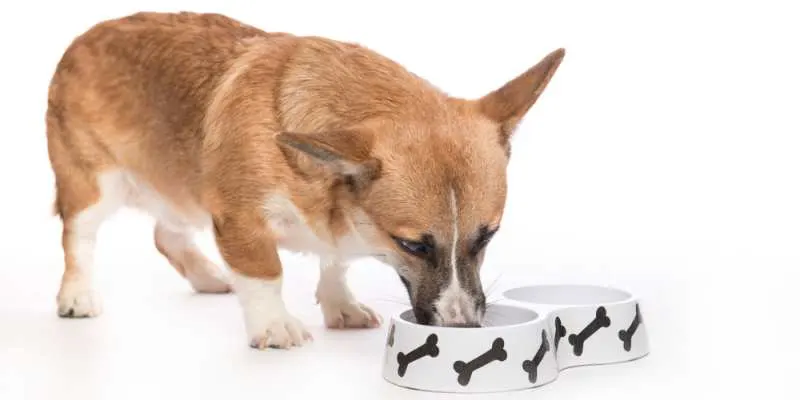
Digestive Tract
This is probably the most important part of the explanation for this topic. Your corgi’s digestive system isn’t all that much different from other dogs, but there are some characteristics that may be the reason behind your corgi pooping so much.
Corgis have a quite recognizable body, meaning that they have a long body with short legs (that are not important for this topic). Their long bodies allow them to hold more things in their bowels. This means that they’ll hold much more poop to begin with than some other dogs that are their size but don’t have the same body shape like them.
For some unknown reason, corgis don’t let all the poop out at once but leave smaller piles of feces behind them multiple times a day. This is something that you can’t change that easily, so be patient and work with your dog for as much as it’s needed for them to figure out what you want out of them.
Their digestive tract allows them to do this since they have much less hard time holding it than other dogs precisely because of the long bowels that they have in their bodies. Because of their slightly specific digestive tracts, they can also be prone to obesity.
It’s also something to take notice of, but that’s not the main point of the text, so let’s get back to why they poop so much!
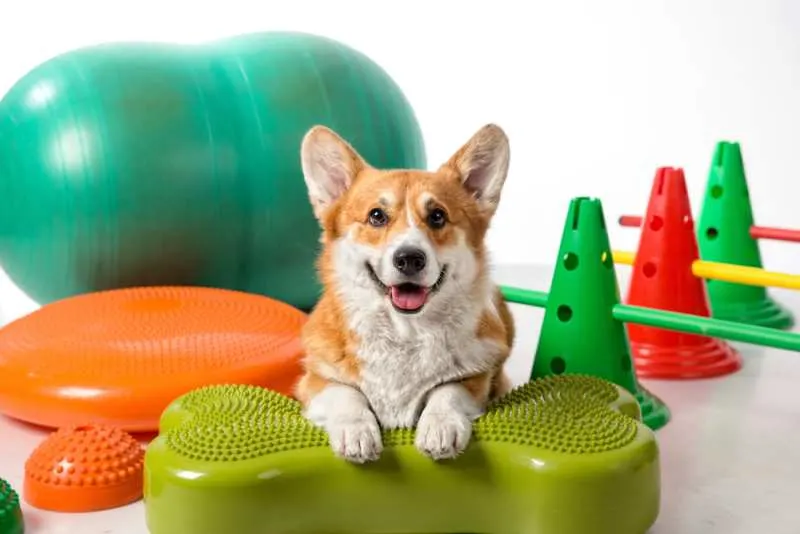
Diet
A corgi’s diet can play a huge role in why they poop so much, especially when they’re little. Corgi puppies (like almost all other puppies) have weak stomachs and can experience diarrhea often.
If you see your corgi puppy pooping too much, but it’s diarrhea, there’s a deeper problem than just their habits.
The change in their food or a new food that you’ve introduced to their death might be the source of this occurrence, but I definitely advise you to consult with your corgi’s vet and see if there might be a different problem that’s causing all the diarrhea to occur.
It’s also possible that your corgi puppy does poop more often than usual but doesn’t have diarrhea. There also might be a problem behind this occurrence, but this also might be normal.
Puppies, generally speaking, have a problem adapting to new foods and getting used to them. Pooping more often after changing your dog’s granules. You need to give your corgi some time to get accustomed to new food and then see if they poop more often than before.
Now, there are some things that you can do if you notice your corgi’s poop becoming more solid or turning into diarrhea.
- Diarrhea – if you see your dog having diarrhea you should feed them more dry food that is rich in fiber.
- Solid poop – this is more easily regulated with more water and some food that is lighter with less fiber and salt in it.
Learn More: Forbidden Treats: What Are Corgis Not Allowed To Eat?
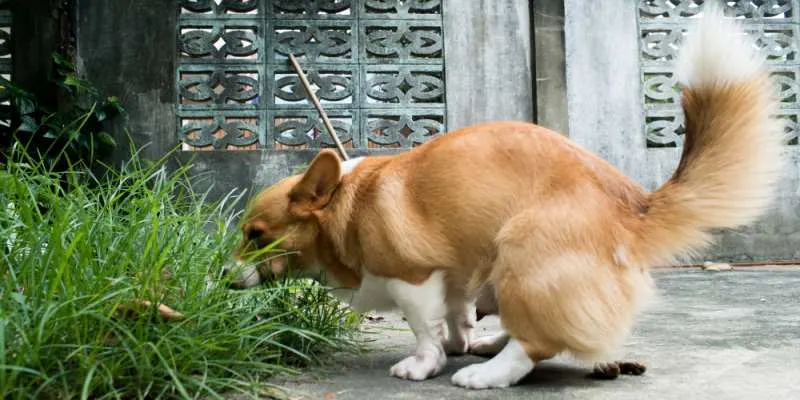
Regulation
You see, much of your corgis pooping habits can be influenced by its owner. This means that you need to partake in the process of regulating it. It’s expected that your corgi poops three to four times a day, but anything over that should be regulated.
How can you regulate it besides the things I’ve already listed? Well, let’s take a look:
- Pick the time to go pooping – if you set the standards for when it is okay to go poop, and not let them do this instead of you, you won’t have a problem containing them.
- Stay outside for long enough – you can force your corgi to poop multiple times in one walk if you just give them enough time and give them treats right after the second or even third poop. This will stimulate your corgi to poop two or three times before you head home.
- Punish them when they poop inside – this will force them to hold it in for longer periods of time and poop more when they get the chance which will result in fewer times your corgi needs to go poop.
As you can see, there are things that you should do to keep your corgi’s habits in check. This is a good practice not only for pooping and peeing but for everything that’s related to your corgi because these dogs are known for setting their own rules once they realize you didn’t impose any rules on them.
Don’t get me wrong, there is a genetic background for your corgi pooping so much, so don’t be harsh on them because you can influence this to a certain limit.
After you see your dog has hit its limit for daily “poop-walks” (as I like to call them), you should just keep that tempo and not try to force your corgi to hold its poop for a longer period of time.
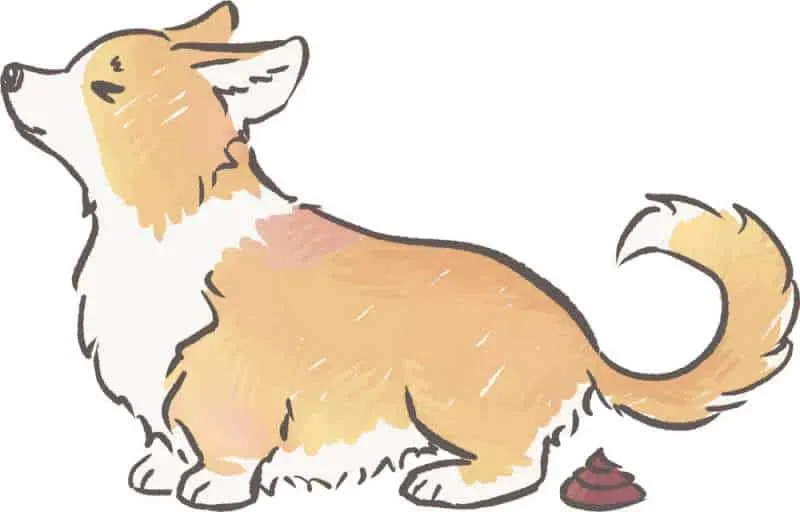
Why Do Corgis Poop So Much? – To Sum Up
I think it’s pretty clear why do corgis poop so much.
There’s a genetic aspect, a dietary aspect, and a few habits thrown in there. You, as an owner, should partake in making those habits as healthy as possible for your dog so don’t forget that you also have a responsibility in this case.
Remember that patience is key, and that you shouldn’t force your corgi to do things that it can’t physically do. Also, you should pay attention to your dog’s diet because it can also have a huge impact on how much they poop.

